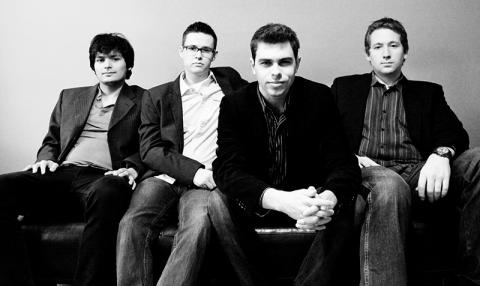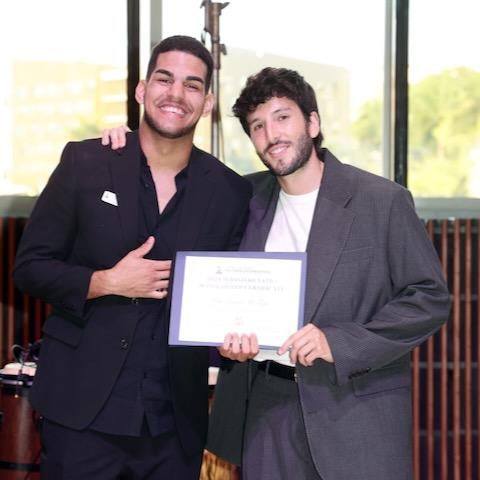Hexany Audio, Berklee-Bred Business, Blasts Off

Hexany Audio colleagues (from left to right) Juan Cortés, Andy Forsberg, Richard Ludlow, and Richard Gould
Just as many musical collaborations are forged at Berklee, so too are business partnerships. A good case in point is Hexany Audio, an audio company specializing in sound design and music for video games and interactive media that currently serves clients in San Francisco, Philadelphia, Los Angeles, Boston, Germany, New Zealand, and Australia. Hexany is manned by a small group of Berklee-trained sound designers and composers who identify themselves, lovingly, as gamers and geeks, and who are all—or will soon be—Berklee alumni.
From Classmates to Colleagues
Hexany is the brainchild of Richard Ludlow, a dual electronic production and design (EPD) and film scoring major who will be graduating in May. The ambitious Ludlow participated in five internships while at Berklee, including one with composer Lucas Vidal ’06, and came to the college with an entrepreneurial audio career in mind.
“I think immersing yourself in the industry that you want to form a business in is just paramount,” Ludlow says. “I basically learned everything I know about composition and video game audio here. Not to be the Berklee poster child or whatever, but for people wanting to do music and sound for games, there is no better place.”
In particular, Ludlow—sharing a sentiment echoed by several of his Hexany colleagues—points to Berklee associate professor Michael Sweet as his “greatest inspiration and supporting force.” Sweet and Ludlow will present at this week’s PAX East gaming conference, along with Berklee assistant professor Duncan Watt and Richard Gould ’13.
Gould, another dual EPD and film scoring major at Berklee, says Ludlow approached him in 2011 “with what was then sort of a shared portfolio site.” For Gould, who is from the U.K., the concept was a natural extension of his belief in the importance of advancing one’s network as opposed to just one’s individual career (with a similar rationale, Gould and Ludlow cofounded Berklee’s Sound Design Network).
After successfully recruiting Juan Cortés ’13, who hails from Colombia, Hexany began as a showcase for the trio, but in 2012, it expanded to include Andy Forsberg ’13, a film scoring major who left Berklee a year early to take a job with film composer William Ross. A fifth member of the team, Sam Ewing ’13, is now in a mutual trial period.
Each Hexany member composes music but also has a unique specialty. Gould generally focuses on sound design and orchestral music; Cortés leans toward electronic music and composition; Ewing’s sound design and composition is informed by his programming knowledge; Forsberg aims primarily at developing clients; and Ludlow runs the business.
“We started out as this collective of shared work, and now we’re transitioning to this company that is going to feed us,” Ludlow says. While there are no guarantees for any startup, these Berklee alumni think they have the right combination to take Hexany to the next level.
The Skills to Pay the Bills
According to Cortés, who “slowly fell in love with Berklee” as a jazz guitarist who found that his passion for music was on the production side, the skill set he developed at Berklee and now exercises at Hexany has worked wonders.
“Every time I go somewhere (for audio work), people say, ‘Oh, so you know Kontakt? You know how to code? You know audio implementation? There are people like you that have been prepared at this college?’” says Cortés, whose credits include work for the likes of Coca-Cola. “They get really excited about it.”
Ewing, the as-yet unofficial fifth member of the Hexany squad who is currently interning with television composer Bear McCreary, notes that the Hexany crew’s skills were forged in part through hours upon hours of project work at Berklee.
“For example, in Music and Sound Production for Games, Richard (Ludlow) and I had to collaborate on this 5.1 surround sound mix of a video game trailer,” Ewing says. “We had three hours of studio time to do it but it wasn’t as good as we wanted it to be so we got another three hours somewhere else. After that, we got another three hours at another studio and stayed up until 5 in the morning working on this trailer. At the time, I didn’t think, ‘Oh, this could evolve into something later.’ But when it all comes back around and Richard’s talking to me about Hexany, I thought back to that cool collaboration and how much creative energy there was. Those kinds of things really matter.”
An Edge in the Berklee Incubator
As Hexany evolves from shared portfolio roots into a bona fide company, Forsberg is optimistic about the Hexany model.
“Not only are we all great friends, but if you look at the video game industry right now, you see that some people do music and some people do sound design, but we do both—and for video games, we also do all of the implementation into the game,” Forsberg says. “Creative audio often gets lost among game directors and designers because it’s more of a last-minute thing, and that’s really what we’re trying to address and be at the forefront of, so we’ve found an awesome niche as a one-stop shop.”
Ludlow notes that Hexany’s development time at Berklee gives it a distinct advantage, which is the kind of approach that the college’s new Institute for Creative Entrepreneurship (BerkleeICE) looks to further encourage.
“We know that so many startups fail and that we could totally be gone in a year or two, but we’ve had this time to incubate that I think a lot of startups don’t have,” Ludlow says. “I think that has set us off on a really solid foundation and now we’re ready to expand.”
That expansion will kick into high gear in September, when Hexany will establish its central office in a studio space in Los Angeles. With plenty of work already on the docket, Ludlow says, Hexany will be looking for Berklee interns in no time.




